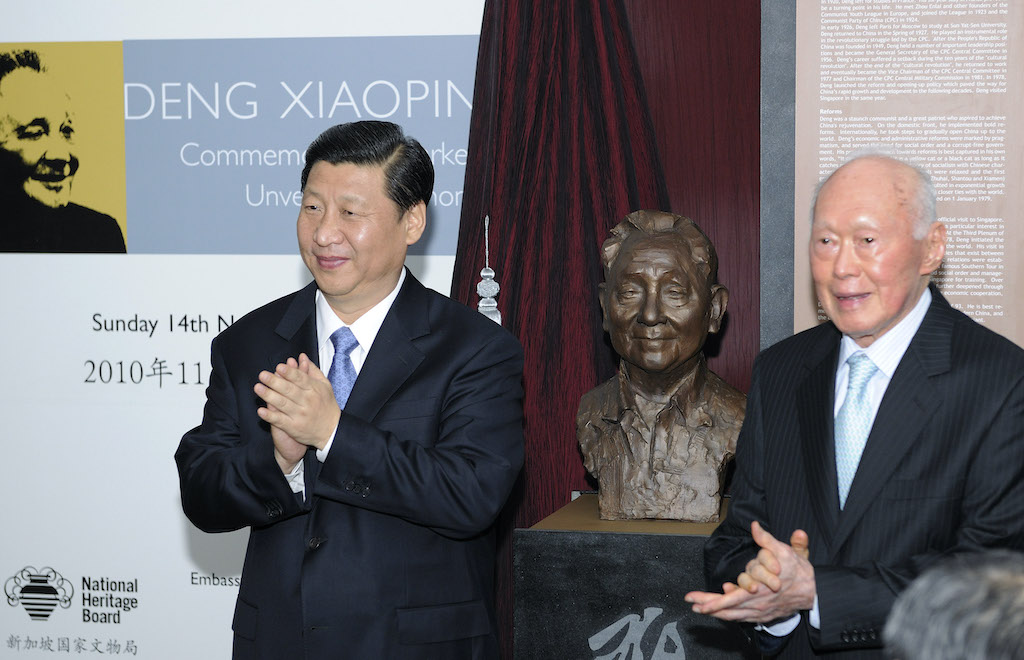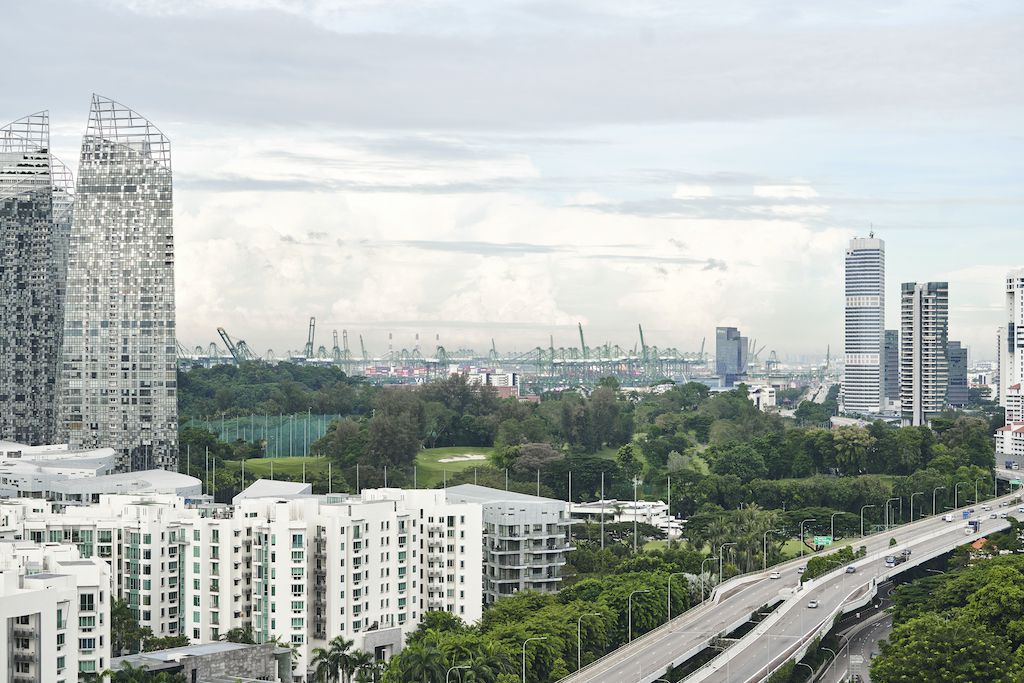Singapore’s high-wire act in relations with China
Decades ago, Singapore helped Beijing’s reformers rescue China’s economy. Today, the China-Singapore relationship has soured, despite the bilateral trade between the two remaining robust. The city-state must now watch its steps in the international arena.

In a nutshell
- Singapore is the wealthiest nation in Southeast Asia
- Singapore-China relations remain economically strong
- Politically, Beijing increasingly leans on the city-state
The city-state of Singapore owes its existence to the dominant Chinese identity. It was thrown out of Malaysia’s newly independent state in 1965, largely due to the insecurity of Malay politicians who worried about the Chinese minority having too much power, particularly economic power. Singapore had been deprived of its hinterland overnight, and had to fend for itself under the leadership of the first Prime Minister Lee Kuan Yew (1959-1990), often referred to by his initials, LKY.
All throughout Southeast Asia, there are Chinese communities. Never in its long history has China established colonies overseas. However, countless Chinese communities have settled over centuries outside the country’s borders. There are “Chinatowns” from New York to Yokohama, from Lima to Saigon. In Southeast Asia, Chinese expatriates have done very well economically, which has created resentment and envy. Indonesia and the Philippines witnessed the most tragic pogroms.
Singapore is the only ASEAN member country with a Chinese majority population.
A major problem faced by these scattered Chinese communities is the locals’ persistent suspicion that their loyalty may not lie with the country of residence but rather with the colossal motherland across the seas. That Chinese communities tend to stick together and do not integrate with the larger populations tends to feed these suspicions and creates further animosities.
In all this, Singapore is an exception. It is the only member country of the Association of Southeast Asian Nations (ASEAN) with a Chinese majority population. It is also by far the wealthiest nation in the region. Currently, the Singaporean economy’s prospects remain positive; the city-state is expected to emerge largely unscathed from the Covid-19 crisis. There is also talk of Singapore’s businesses profiting from the dark clouds that have gathered over Hong Kong.
China-Singapore relationship: The Honeymoon Phase
Initially, in the early 1960s, relations between newly independent Singapore and Mao Zedong’s People’s Republic of China (PRC) were strained. Around the same time that Singapore was pushed into independence, Chairman Mao launched his Great Proletarian Cultural Revolution. A tidal wave of destruction and oppression swept the country in 1966 and petered out only a decade later, with the death of Mao Zedong in 1976 and the arrest of the “gang of four” of his innermost circle. That attempt to reengineer the society with brutal force was mainly a domestic tragedy, but the Great Helmsman harbored larger aspirations to ignite a “global war of the huts against the palaces.”
When Singapore became independent, the Cold War was at its height. The Vietnam War was to continue for another 10 years, and the United States was committed to its strategy of trying to prevent countries from falling like dominos into the lap of the Soviet bloc. A large part of Southeast Asia was on the front line of the East-West conflict. At that time, Moscow and Beijing had fallen out with each other. The Chinese communists considered their Soviet counterparts as ideological renegades. The Chinese leaders were on their own mission to spread trouble in the world and certainly had their “fifth column” agents active in Singapore to stir social and political unrest.
When, in the late 1970s, the PRC embarked on its historic socioeconomic reforms under the leadership of Deng Xiaoping (1978-1989), a new epoch of the China-Singapore relationship began. In many ways, the 1980s, 1990s, and early 2000s were the golden era for the Sino-Singaporean association. That was when Beijing looked toward Singapore for guidance and assistance in its modernization projects. Although paramount leader Deng (born 1904) was by age senior to Prime Minister Lee (born 1923), he treated Singapore’s founding father as his economic reform guru.
Beijing will work with great determination toward the removal of irritants and injustices from the past.
The apex of this long honeymoon was to come in 1994, shortly before the death of Mr. Deng in 1997, with the establishment of the China-Singapore Suzhou Industrial Park (CS-SIP). There was an impressive role model for what was to be China’s future. Without a doubt, the authoritarian approach to government finessed by LKY was a paragon for Mr. Deng, who in economic terms was a pragmatist but in terms of political development remained a lifelong authoritarian.
Singapore’s geopolitical challenges
Obviously, since the ascent of Xi Jinping to the top of the Chinese leadership in 2012/13, China’s position in the world and toward the world have changed in very significant ways, which necessarily also determined the China-Singapore relationship. The emphasis on pragmatism that was the Deng era’s hallmark has given way to a strong posture of national reassertion. At its center is the conviction that as the 19th and the 20th centuries had seen a humiliation of China, the 21st “Asian century” will witness its triumphant return at the apex of the world’s greatest nations.
This resurgence may not result in the immediate expansion of the territories controlled by Beijing. However, it stems from the leaders’ conviction that the world and China’s neighbors must grasp what their new status vis-a-vis China is and must be. At the same time, the world is to understand that Beijing will, with greater determination than ever since the establishment of the PRC, work toward the removal of irritants and injustices from the past. This attitude is evident in China’s bellicosity in the cases of Hong Kong and Taiwan.

The Chinese expansionism in the South China Sea, where Beijing has both island and maritime territorial disputes with as many as six countries, must be of grave concern to Singapore. Brunei, Indonesia, Malaysia, the Philippines, Taiwan and Vietnam are all involved in numerous disputes with China. The U.S., which acts as the guarantor of global navigational rights, has repeatedly expressed concern over China’s excessive territorial claims and its expansion of military installations on several islands and shoals. In this context, the U.S. Navy and Air Force regularly conduct “freedom of navigation operations” (FONOPs) in the China Seas consistent with international law.
Singapore has made it clear that it is not a claimant in any of the South China Sea disputes and offered to be a conduit for negotiations. Such prudence, however, does not spare the city-state potential trouble with Beijing, as Singapore has also expressed hope that China would abide by international law. For its part, Beijing has made it clear that it expects Singapore to exert its influence within the ASEAN to prevent the internalization of the conflict. Apparently, the China-Singapore relationship is expected to yield a very high degree of understanding from the only other country in the region with a Chinese majority population.
In 2016, a Hague-based international tribunal found that the so-called nine-dash line, an ill-defined demarcation line used by China for its territorial claims in the South China Sea, had no legal basis. Singapore supported this decision, which prompted a harsh rebuke from Beijing. Since that incident, Singapore has been at pains to maintain its neutrality on the issue.
Beijing will work with great determination toward the removal of irritants and injustices from the past.
Undoubtedly, the nature and climate of U.S.-China relations must be of prime concern to Singapore. In early 1968, two years after Singapore’s independence, the United Kingdom announced its intent to withdraw from its major military bases in Southeast Asia and the Persian Gulf by the mid-1970s. In 1971, Britain left Singapore in a sudden move, painful to the host country as the military facility had provided substantial local employment. Since the British withdrawal, Singapore has had no formal military base treaty with a foreign power. However, the U.S. naval and air forces regularly visit the harbor city.
Dealing with an ever more powerful China
Singapore enjoys the many advantages of a modern city-state. It offers its citizens one of the highest living standards in the world. However, like all small countries integrated into the world economy, Singapore is also vulnerable. It has exploited its geographic position to the maximum, establishing itself as a global hub for air and sea traffic, and serves the region as a center of commerce and financial transactions. It puts diplomatic emphasis on regional cooperation and on good neighborly relations to protect these vital interests. The ASEAN platform is useful toward these goals, but the organization does not have any military muscle and is, by far, less consolidated and influential than the European Union.
When it comes to national defense, Singapore follows a policy similar to that of Switzerland. Its cornerstones are general conscription and credible defense – within the realm of a small entity’s military capabilities. The significant difference with Switzerland is that Singapore functions in an environment where many geopolitical elements remain in flux. And with the rise of China, geopolitical imponderabilities in Southeast Asia are only becoming bigger, thereby putting unprecedented pressure on the China-Singapore relationship.
One matter has become very clear in recent years. Singapore cannot ignore that Beijing keeps a close eye on its moves on the international scene. This lesson was learned with the Chinese reaction to the Hague court verdict. Singapore is well-advised not to show satisfaction at China’s difficulties in Hong Kong or try to profit from the former British colony’s troubles by snatching Hong Kong business and luring investment to its shores.
In China’s Belt and Road Initiative (BRI) framework, a continent-wide infrastructure construction program, Singapore is offering its global expertise in business, trade, and communication. These soft aspects of the Singapore success story continue to interest China. However, the days when senior statesmen Deng and LKY dominated the scene on nearly equal footing are irretrievably gone.
Scenarios
With the rapid development of China into one of the world’s most advanced economies – an ambition that is driving President Xi and his leadership team – China’s need for external inputs into its modernization is diminishing. That reduces Singapore’s strategic importance for China. In the balance of power of China-Singapore relationship, we witness a determined shift away from Singapore and on to China.
What can be the strategy pursued by the city-state? Without a doubt, Singapore has been good at keeping up with innovation and continuously enhancing its location advantages. The progress in China indicates that the need to innovate never comes to an end. In the coming years, too, Singapore will pursue and enhance its endeavors to strengthen its formidable economy even further.
The city-state’s primary tools in its strategy are its education system’s excellence, a very high degree of social stability and its exacting standards in transparency, service reliability and management quality. In all these fields, Singapore holds a substantial edge not only over China but the whole of Southeast Asia.






